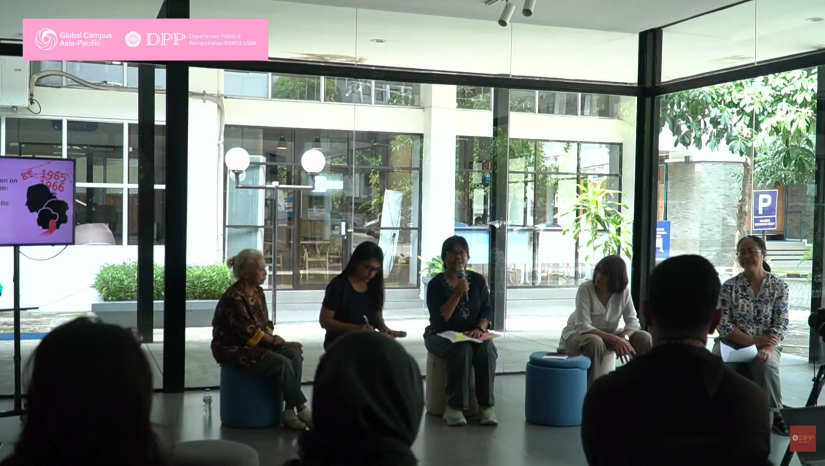
Yogyakarta, February 15th 2024─The Department of Politics and Government FISIPOL together with Global Campus Asia-Pacific and Pares held a seminar-workshop entitled “Non-judicial Resolutions on Human Rights Violation: Perspective from the 1965-1966 Domestic Survivors and Exiles” at Amphitheater BRIWORK FISIPOL UGM and Live Streaming on the DPP UGM’s YouTube channel on Thursday (15/02). The workshop aims to discuss President Joko Widodo’s initiation of a non-judicial resolution to address the limited rights of survivors under the Soeharto regime and the recognition of 12 gross human rights violations in Indonesia, including the 1965-1966 tragedy from the perspective of victims and exiles. The initiative has been criticized by human rights activists because the resolution is considered to make the history of human rights violations unclear.
Evi Lina Sutrisno, the Lecturer of DPP Fisipol UGM, in her opening remarks mentioned that Indonesia had experienced gross human rights violations, referring to the case of September 30, 1965 for the murder of 7 generals which until now it is still not clear who is responsible for the murder, mass repression, detention, torture, enforced disappearance and murder of PKI members, its supporters, and the people who were suspected of having leftist ideology tendencies under Soeharto’s orders.
“There were about 1 million victims in total. The anti-communism and PKI propaganda lasted for 32 years of Soeharto’s rule. Until now, the survivors face discrimination and restrictions from the government,” Evi explained.
Pipit Ambarmirah, a representative of Kiprah Perempuan Indonesia, an organization of women survivors of 1965-1966, said that victims of ‘65 had experienced a lot of violence, such as verbal, physical, hanging violence, sexual violence, and financial violence. “The discrimination faced by victims still persists to this day, such as the prohibition of registering for civil servants and ABRI, intimidation, to differentiated ID card markers,” said Pipit.
Meanwhile, Atrien Utrecht, Secretary of Watch ‘65, an association of exiles and activists who volunteered for the 1965 International People’s Tribunal held in November 2015 in The Hague, explained the perspective of exiles.
“These are people who were abroad at the time of Soeharto’s 1965 coup. And because of the consequences of the coup, they could not return home,” Atrien explained.
Atrien mentions that there are two groups of exiles, namely students who were sent to study abroad and people who were in the diplomatic service of other countries such as ambassadors or embassy staff and delegates. Students who refused to submit to Soeharto had their passports revoked and became forced migrants because they could not return home. The situation improved slightly in 1998 during the Gus Dur administration which granted passports to exiles, although this did not last long due to Gus Dur’s impeachment.
Atrien also called PPHAM nonsensical. “How can you really rehabilitate a survivor, let alone carry out reforms to ensure their return, if you haven’t even established the truth,” she explained. According to her, what the exiles need is an official apology from the government, apology for all the injustices that have been done to them and to restore their good name in the eyes of the public.
